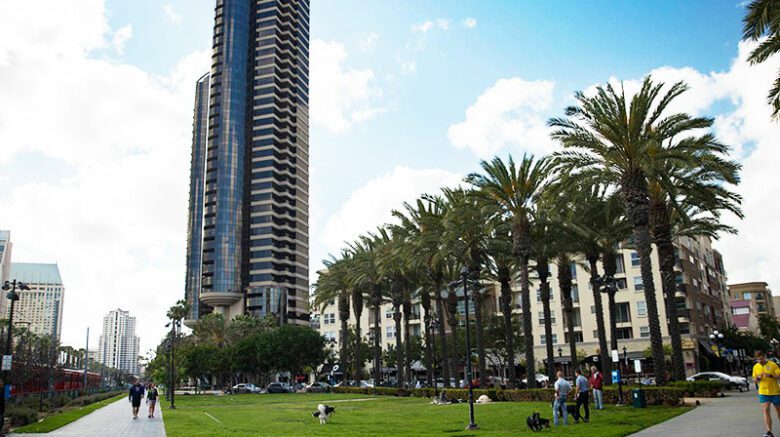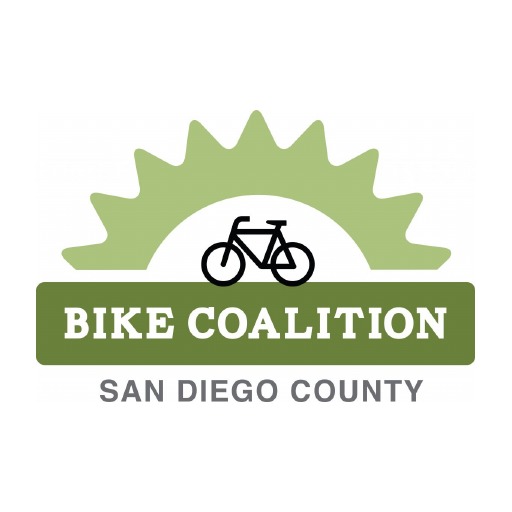Post by Chloé Lauer
By advocating for safe streets and new bike paths, trails, and lanes and by educating people on how to safely and enjoyably ride their bikes, the Bike Coalition’s work has made our lives healthier, our communities more connected, and our cities more vibrant.
Yet our work is not done.
If you want to make a change in the world, change your streets.
– Janette Sadik-Khan, Former Commissioner of the New York City DoT
As the incoming Executive Director, I commit to building coalitions that effect positive change in these four areas:
- Mobility Justice:
The Bike Coalition is committed to rectifying injustices and supporting all San Diegans in having access to safe and pleasant bike routes to work, school, parks, and other destinations.
As a study by Will Rhatigan, our former Advocacy Director, demonstrated, “Black people are more than four times as likely as white people to be stopped for biking and walking infractions in San Diego, according to data from the San Diego Police Department.”(1) The racial bias continues with harsher treatment of Black and Latino residents. Infrastructure inequities are also highlighted in the study. When sidewalks and bike lanes aren’t safe and continuous, it’s harder to follow the law.
2. Community:
The Bike Coalition is committed to enabling communities to lead the transformation of their own neighborhood bike infrastructure, connecting more deeply with one another during the process.
“It is primarily through the strength and joy of our community involvement that we begin to heal the alienation and disconnection so prevalent in American cities,” explained a Portland, OR participant in an intersection improvement project.(2) Connecting with our communities while advocating for shared passions like riding bikes is good for our mental health. A recent study by Karen Chen et al. published in Science Advances shows that depression is more common in suburbs than in city centers due to extended car commutes, the isolation of single-family zoning, and the lack of shared green space.
3. Sustainability:
The Bike Coalition is committed to promoting bicycling as a reliable, safe, and efficient mode of travel, especially for the first- and last-mile.
“Over 50 percent of San Diego’s total greenhouse gas emissions come from personal transportation,” according to the City of San Diego’s 2020 Climate Action Plan report. To reduce those emissions, we must reduce vehicle miles traveled and shift to transportation modes like biking and walking that don’t produce emissions. The City’s Climate Action Plan calls for 35% of trips to be biking and walking by 2035, up from 6% currently. Since nearly 30% of car trips are less than a mile, shifting those trips to biking or walking will enable us to meet our CAP mode share goal.
4. Service:
The Bike Coalition is committed to serving all communities and all types of bicyclists in San Diego; our work empowers others to organize, act, and realize lasting positive change.
In the now classic 1971 book Rules for Radicals, Sal Alinsky calls us to serve as organizers rather than leaders: “This is the basic difference between a leader and an organizer. The leader goes on to build power for purposes both social and personal. She wants power herself. The organizer finds her goal in the creation of power for others to use.” Our work at the Bike Coalition enables others to more easily access their own power, whether to organize within and for their communities or simply use their own two legs to power their bicycles and get where they need to go.
Hey San Diego, let’s work together to make our streets more beautiful, inspiring, accessible, and safe!
Footnotes:
(1) Katie Hyson in the June 5th, 2023 Union-Tribune article entitled Black San Diegans more likely to be stopped for biking, walking infractions.
(2) Mike Lydon & Anthony Garcia Tactical Urbanism: Short-term Action for Long-term Change, pg. 101.


